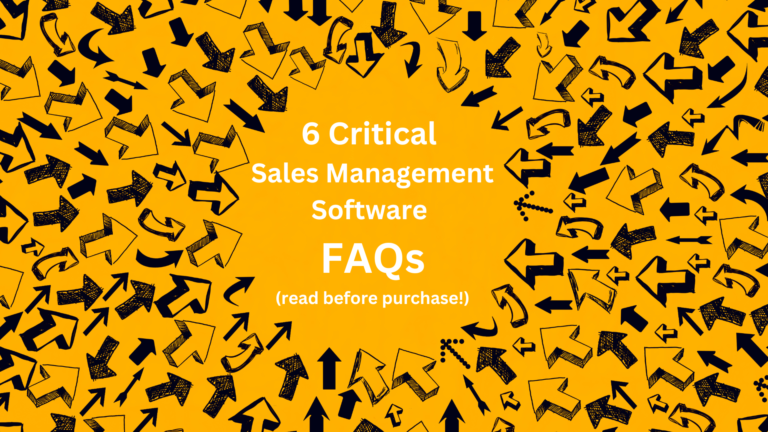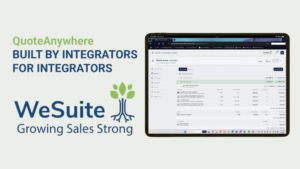Six Critical FAQs About Sales Management Software for Security Companies

By Tracy Larson
Why do security companies need dedicated sales management software? Don’t CRM and ERP solutions cover the bases?
If you need a cardiologist, would you settle for seeing a GP? Definitely not!
Sales are the heart of your business. When sales stop pumping, companies wither. Specialized functions demand appropriate tools and support. Sales are no exception.
ERP software is like your general practitioner, the first line of defense. A company’s ERP may have some sales functions built in, but they are a small fraction of what dedicated sales management software can do. Security sales is a specialty. Not getting the mix of labor, parts, other costs, and services right in sales has major impact afterward.
CRM solutions fall short too. Managing contacts, which is what CRMs do, represents the tip of the sales iceberg. Sales teams deserve a robust platform to support the entire sales process, from contact to contract.
There are so many solutions out there. How do I narrow my search?
Solutions that work well for B2C companies may not include the right tools for B2B sales. And software designed to sell simple products or solutions typically lacks the flexibility to support complex system sales.
Most software is not designed for a specific industry. The manufacturers want to maximize the market for their solution and will claim that they can customize it for individual sectors and client needs.
Buyers beware! Before investing, speak with customers who sell similar products and services. How well does the software support their sales process? Can it automate workflows? Did it improve quoting accuracy? Was it difficult and expensive to deploy?
How is sales management software designed for selling security different from industry-agnostic solutions?
Security is a sector where software specialization makes a big difference in how easily and accurately it can support complex system design and quoting. A single security project may include hundreds of parts, with prices that vary by customer, procurement options, quantities, and other factors. Labor categories, cost and sell rates, often vary by region, system, and project. Part level labor may not be supported. Quotes often include recurring services revenue and miscellaneous costs for travel, permits, and other items. Profits are based on margin. It’s all very complicated!
Companies that opt for a “generic” platforms with a “sales” component find that the software ultimately cannot be customized to meet their needs. Additionally, the time and cost have way too many zeros at the end.
Security sales quoting software is configurable “out of the box” and often covers at least 90% of desired functionality. Changing some operational process is easy to accept, as most often, it produces better end results.
Besides Quoting, What Else Can Sales Management Software Do?
Sales encompass many phases: prospecting activities, generating and nurturing leads, meeting prospects, designing solutions, quoting, developing proposals, and closing. Then, there are related activities, like approvals, calculating commissions, standardizing T&Cs, maintaining current products and pricing, reporting and analysis.
Some sales software designed for the security industry offers specialized tools that focus on specific aspects of the sales process, like designing system surveys or creating proposals. Others provide a broad and deep, contact-to-contract solution. Their centralized platform and automated workflows bring cohesiveness and efficiency to the entire sales organization. The best-in-class solutions additionally work seamlessly with other business software to integrate sales with accounting, marketing, operations, and other departments.
How Much Should I Budget?
Almost all of today’s solutions use a subscription model that includes a charge for initial configuration and training, and recurring license fees based on the configuration and user count. The investment can be categorized as an OPEX, and systems can be scaled up or down based on the number of active users.
Don’t assume the most expensive, well-known solutions are the best, as mentioned earlier, after much time and money, the solution still may not deliver as expected. Likewise, inexpensive solutions often result in spending time and money again, because they simply don’t meet the need. Industry-specific solutions with a baseline resembling your sales model and process will serve you better.
When you find the “right” software, it will pay for itself very quickly, making “budgeting” moot. With your sales team spending more time selling instead of dealing with manual processes, quoting with far fewer costly mistakes, and closing at higher rates, ROI occurs very quickly.
When is the Right Time to Invest?
Unlike accounting software, many businesses assume they can get up and running without dedicated sales management software. They consider it a “nice to have” tool they’ll purchase down the road.
They’re wrong. By putting off this critical investment, they may get “up” but never get “running.” Sales management software puts in place repeatable, trackable, consistent sales processes that eliminate costly mistakes and improve efficiencies. They prevent companies from getting stuck in place and help spur growth.
Getting your sales operations in order with the help of sales management software is a good habit, like eating healthy, wearing sunscreen, or investing in a 401K. The benefits accrue over time. The sooner you start, the richer the rewards.
There’s no question; companies that invest early on get a jump start on success. However, it’s never too late for those who haven’t to embrace software that’s good for business.
Recent Post

WeSuite Expands Its QuoteAnywhere to a Full-Featured Stand-Alone Sales Platform
WeSuite, a manufacturer of award-winning sales management software for security technology sales and service providers, is excited to announce the expansion of its web-based sales software, QuoteAnywhere, to a full-featured, stand-alone, lead-to-close sales platform.

WeSuite President Tracy Larson Inducted into Security Sales & Integrations Industry Hall of Fame
WeSuite, a manufacturer of award-winning sales management software for security technology sales and service providers, announced today that Tracy Larson, WeSuite President and Co-Founder, has been inducted into the Security Sales & Integration’s Industry Hall of Fame.

Are You Getting the Most Out of Your CRM? Start by Asking these 5 Simple Questions
Your sales pipeline is your lifeline. It tells you where your deals stand, where your time should go, and how close you are to hitting your number. And your CRM? It’s the tool that keeps your pipeline in check.

Is There a Secret to Closing Security Sales Faster? Here Are Seven!
Pushy, high-pressure sales tactics turn off buyers – we’ve all been there! Fortunately, you can increase your on-the-spot close ratio by being buyer and solution oriented with sales automation software like QuoteAnywhere from WeSuite to support your sales efforts.
